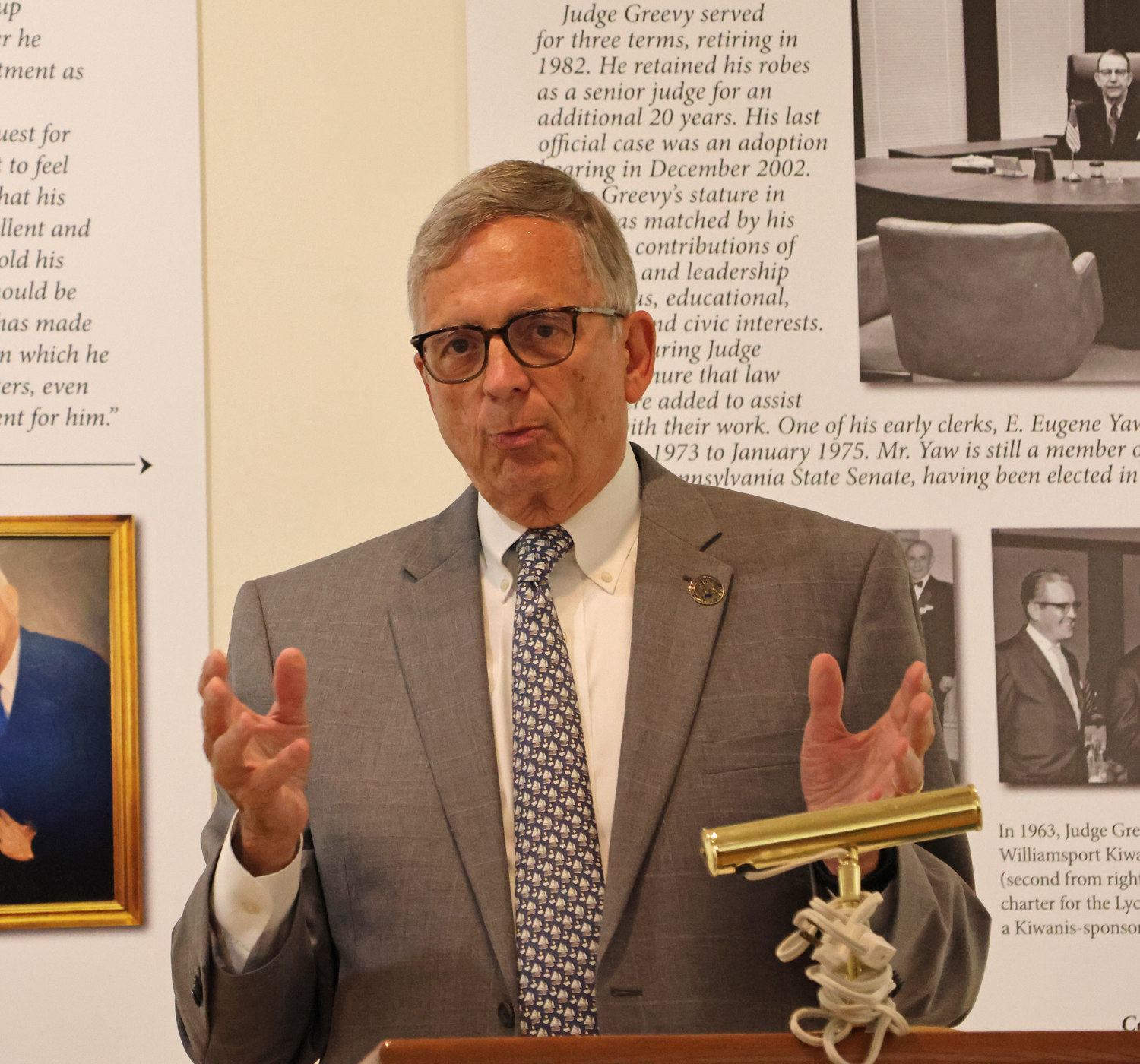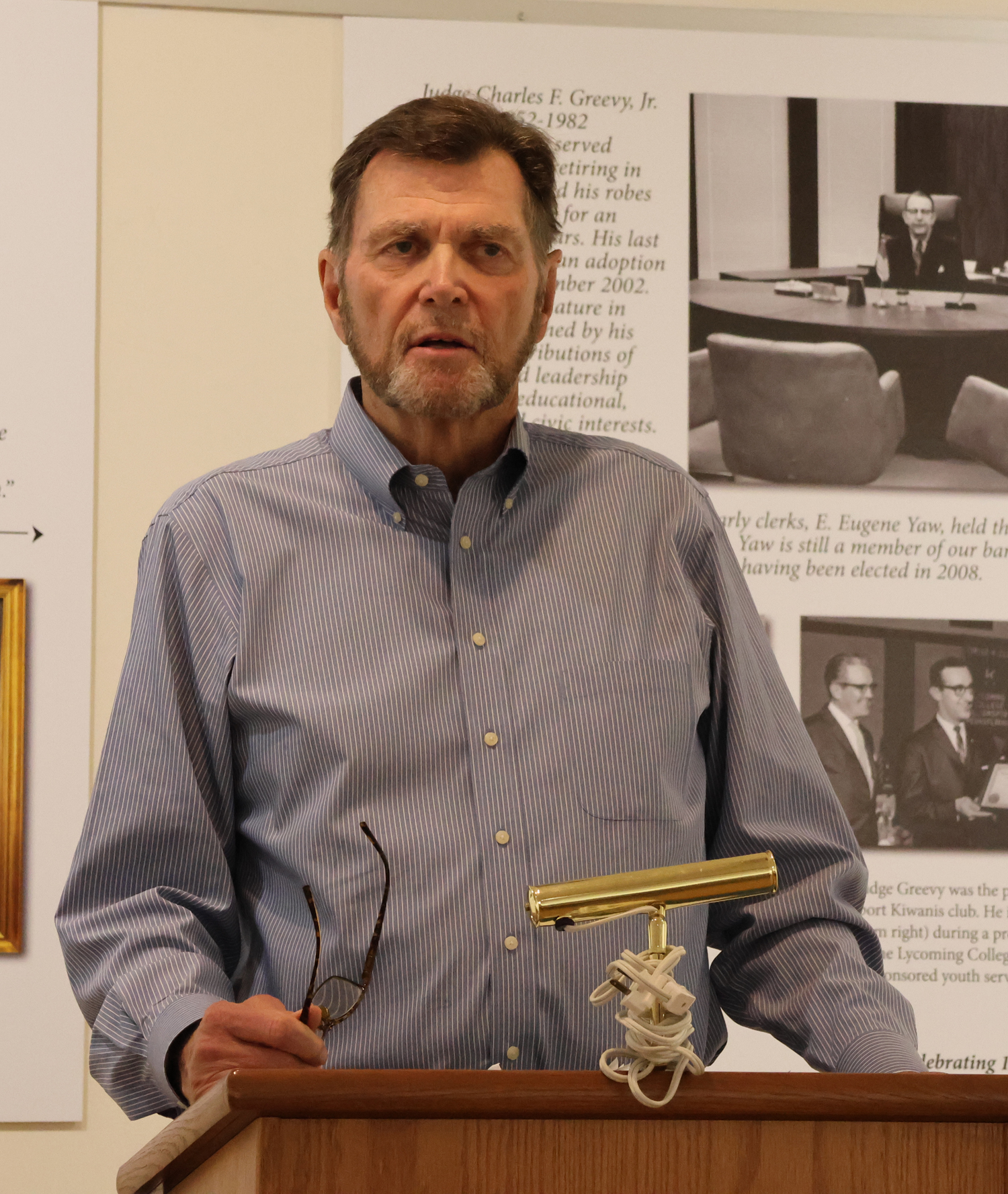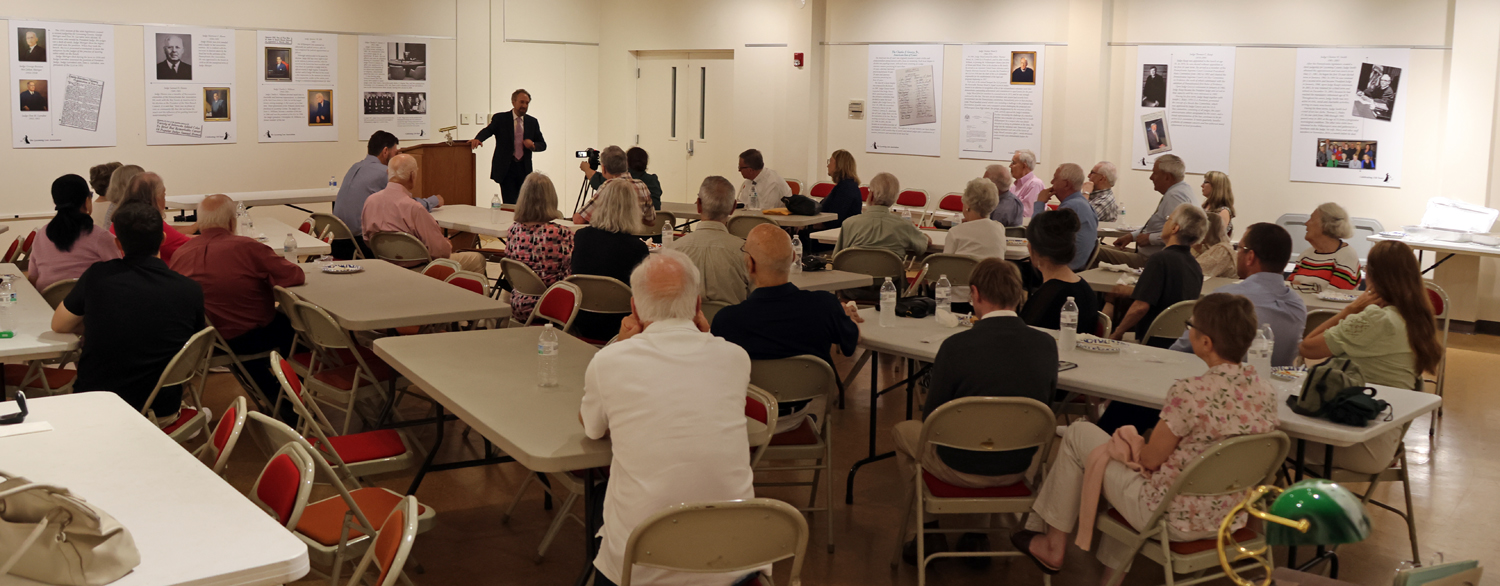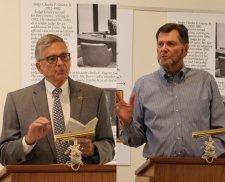Magistrate Judges and Judge Muir the Subjects of Law & Justice Lecture
 “What is a federal magistrate judge?” That is how Judge William Arbuckle began the fifth lecture in the "Law & Justice in Lycoming County" series. He certainly was well qualified to answer that question, as he had served as a federal magistrate judge for approximately 18 years.
“What is a federal magistrate judge?” That is how Judge William Arbuckle began the fifth lecture in the "Law & Justice in Lycoming County" series. He certainly was well qualified to answer that question, as he had served as a federal magistrate judge for approximately 18 years.
The judge gave the audience a bit of background on the history of the position. The Constitution authorizes Congress to establish courts. The first judiciary act of 1789 created a three-tier court system, authorized the appointment of an attorney general and established the Federal Marshall’s department. Then in 1792, Congress gave the circuit courts the authority to appoint “discreet persons learned in the law” to set bail. These individuals were not necessarily lawyers. Their duties expanded in 1812 to include the issuance of warrants.
In 1940, the federal district courts were authorized to appoint commissioners to try cases that arose on federal lands. These commissioners were paid from fees assessed on the parties. Again, the commissioners were not required to be lawyers.
In 1968 the office of federal magistrate was created. For the first time, the federal magistrate had to be a lawyer. Eventually, in 1990, the office of federal magistrate judge was created.
Judge Arbuckle joined the bench as a part-time magistrate judge in 2007. He replaced long time Magistrate Judge (Commissioner) William Askey who had served in the position for 43 years. Askey was a long-time member of the Lycoming Law Association.
At the present time, there are five full-time magistrate judges in the Middle District of Pennsylvania.
Magistrate judges have specific duties: Issue warrants, supervise the grand jury, detention hearings, bail hearings, and to try petty and misdemeanor cases. They also address international prison transfers and can take felony pleas.
They also have what are known as referral duties, where a district court judge will refer a case to a magistrate judge for pretrial management. In that case, the magistrate judge will make recommendations, which then must be approved by the district court. The parties can consent to have the magistrate judge handle all aspects of a case.
The actual responsibilities that will be performed by a magistrate judge will depend on the circuit. Some circuits have very limited responsibilities for their magistrate judges.
In the Middle District, 99% of all Social Security appeals (approximately 70 per year per judge) are handled by the magistrate judges..
One of the significant roles served by magistrate judges in the Middle District is as a mediator. In the four years of the mediation program, he has mediated 135 cases.
He briefly touched on the history of the Middle District of Pennsylvania. When the Pennsylvania federal court districts were first established, Philadelphia and the surrounding counties were placed in the Eastern District, and the rest of the state was placed in the Western District. As Western Pennsylvania’s population grew, this became unmanageable, and the Western District was split into the Middle and Western Districts.
Judge Arbuckle related a little bit about his background, including that he attended Grove City College and the University of Akron School of Law. While there, he worked as an intern in the local prosecutor’s office and ended up prosecuting all the “dog at large” cases.
He became a prosecutor in Ohio upon graduation from law school. He then went back to Erie, his hometown, to work for the Knox Law Firm in the insurance defense area.
He had previously met Leroy Zimmerman, Pennsylvania’s elected attorney general, and when Zimmerman invited him to join the Pennsylvania Attorney General’s office, he agreed to that, serving for several years. He then joined the judicial inquiry board and tried cases for a number of years with that board and its successor.
He ended up practicing in State College for quite a number of years before he applied for and was appointed as federal magistrate judge.
He said he knew and admired Judge Malcom Muir of the Middle District and with that, he introduced Attorney Jack Humphrey to discuss Judge Muir.
 Jack Humphrey was one of Judge Muir’s early law clerks. Over the years, he was involved in producing a documentary and has spoken extensively about Judge Muir.
Jack Humphrey was one of Judge Muir’s early law clerks. Over the years, he was involved in producing a documentary and has spoken extensively about Judge Muir.
Malcolm Muir was appointment to the federal judge by President Richard Nixon, taking office on November 6, 1970. Prior to that, his practice was almost exclusively in the estates and taxation areas.
A story that Judge Muir liked to tell was that while Richard Nixon had some problems as president, he was “a remarkable judge of character” as demonstrated by Muir's appointment.
He continued to serve on the federal bench until his death, July 22, 2011. At that time, he was the second-oldest sitting federal judge at 96 years old.
Humphrey began to work with Judge Muir in 1972. He described Judge Muir as an extremely interesting man, he was smart, organized and a problem solver. He generally solved problems through the imposition of systems.
Muir would challenge himself. As an example of that, Humphrey noted that the judge attended Lehigh University and graduated with a degree in philosophy. The judge told him he never understood philosophy, so that the challenge was to excel in the area of study without really understanding it.
Another example of how the judge challenged himself was that he decided in the 1990s that he would memorize Pi to the first 100 places. He did that and could repeat it into his 90s.
Judge Muir created a system (or perhaps memorized it) by which he could tell the day of the week of any date in history. Muir was “time oriented” and he was very strict in timing attorneys in trial. He used a stopwatch, and would not deviate from his time schedule.
His office was organized by a tickler system. He used 3" x 5" cards kept in his desk for multiple purposes, including to remember birthdays. Humphrey recalled getting a birthday card from Judge Muir every year.
Judge Muir was known to be particularly meticulous. For example, Muir played a weekly game of poker at the Ross Club. Humphrey noted that the came was rather a small one (they had a betting limit of 10 cents). However, Judge Muir would declare as income his winnings on these 10 cent games.
Judge Muir walked to work from his home in Williamsport. At one point, the federal marshal pointed out the security risk involved in that, so Muir devised 15 different routes, and the route that he would take on any particular day was picked randomly. This apparently satisfied the marshal’s office.
Everything in his house was systematically indexed. He had a book which would record the exact location of anything that was stored there.
Judge Muir’s meticulous nature was fed by a gift of a labeling machine. Humphrey told a funny story of a time when Muir had dinner at a local restaurant, and he had observed that the hot and cold water faucets in the restroom were reversed from their normal positions. He used his labeling machine to label the faucets when he was next in the restaurant. He would also label all of his ties with a marker so that he knew when and how he obtained them.
All of his quirks aside, Humphrey pointed out that Muir was a loving man who was well-read and enjoyed learning. He played piano every day. He occasionally composed. When Muir's long-term law clerk named his son after the judge, the judge composed a piece for the child. Judge Muir was also known to have a sense of humor, which was often, given his personality, somewhat unexpected.
When the Williamsport Hospital remodeled its emergency department, the hospital celebrated the life of Judge Muir by naming the emergency department in his honor.
There were a number of other admirers of Judge Muir in the audience. All were asked to relate their particular experiences, and a number of interesting stories were added to the presentation.
The next session in this series is on August 20, when Sue Alberti, Penn College and Susan Achury Plaza, Lycoming College will speak on "Opportunities for Undergraduate Legal Studies and the Future."



